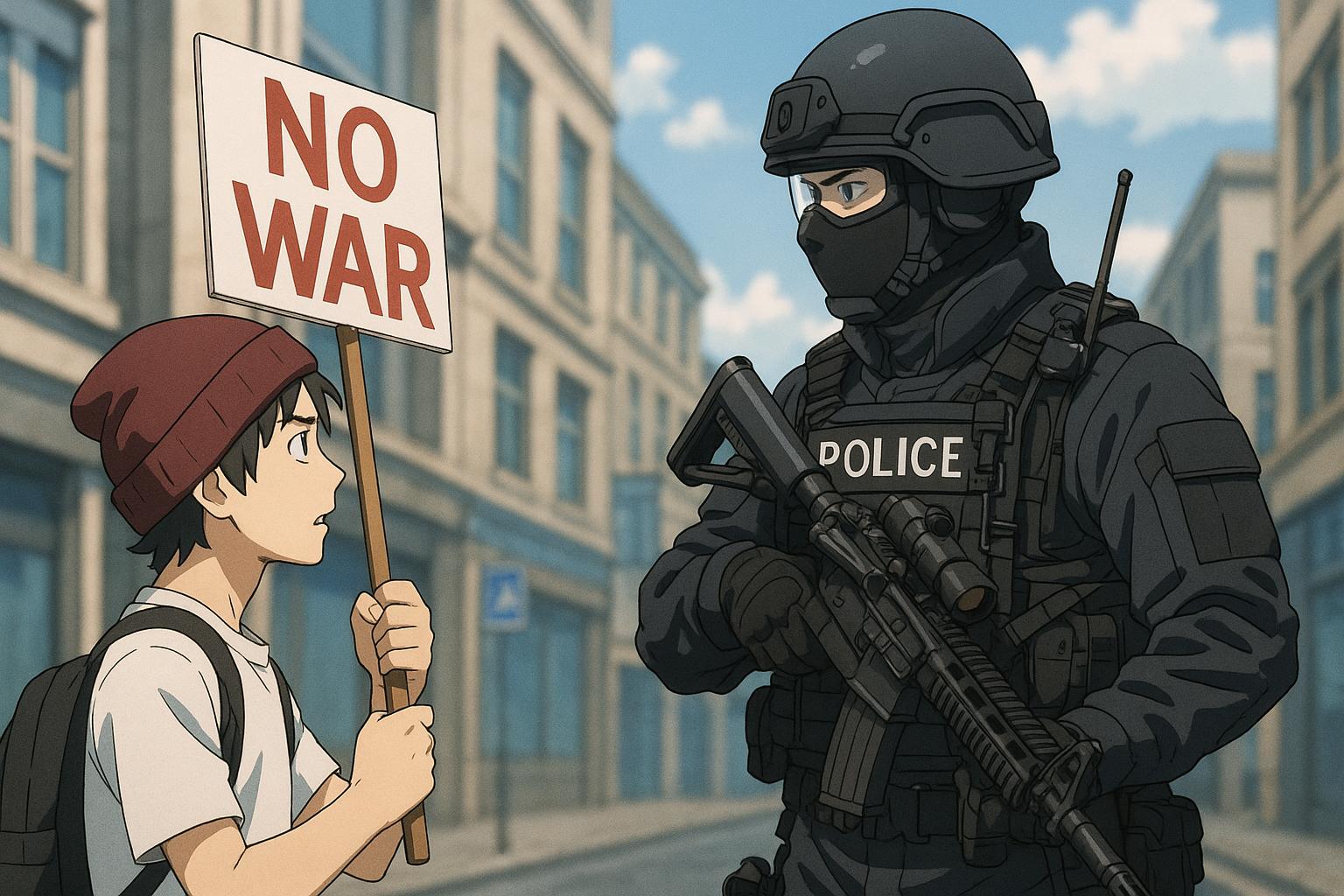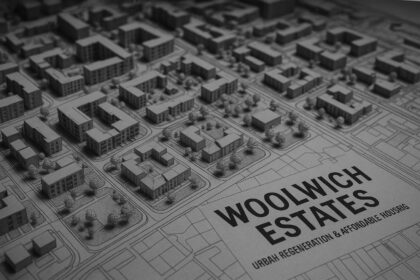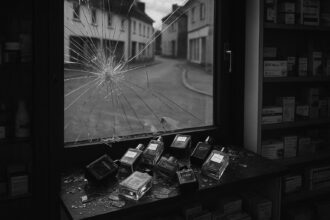A new Institute of Race Relations report reveals the deepening militarisation of UK Border Force and police tactics, highlighting risks to vulnerable communities and civil rights on the fifth anniversary of George Floyd’s death.
The alarmingly high levels of militarisation within UK policing and the Border Force have sparked urgent concerns over civil liberties and the treatment of vulnerable communities. A new report from the Institute of Race Relations (IRR), coinciding with the fifth anniversary of George Floyd’s death, paints a disturbing picture of “hyper-militarisation” in law enforcement, evident at both national borders and in the heavy-handed responses to civil unrest and public demonstrations.
The report reveals a troubling integration of Ministry of Defence (MoD) resources into Border Force operations, marking a drastic transformation in how border policing is conducted. The emergence of a covert Channel threat commander role and the use of counter-terrorism powers by Border Security Command suggest that the Border Force now operates under the dominion of military oversight. According to Liz Fekete, director of the IRR, framing asylum seekers arriving via small boats as national security threats is not merely misguided, but represents a dangerously pervasive narrative that could lead to injury and even death. The escalation of Greek and French police tactics in the Channel, such as proposed pushback measures, serves only to endanger the lives of desperate individuals seeking safety.
Furthermore, the analysis of law enforcement tactics reveals a deeply concerning turn towards aggressive crowd control measures in response to protests. The troubling reintroduction of plastic bullets, which were notably deployed during the Black Lives Matter protests in 2020, combined with Taser use and other “less-lethal” weapons, raises serious concerns about potential life-altering injuries, particularly affecting marginalised populations. Kojo Kyerewaa, a national organiser for Black Lives Matter UK, articulated a critical perspective on the increasingly racialised nature of policing, describing the tools employed against protestors as instruments of oppression rather than protective measures for public safety.
Adding to these alarming developments is a second report from the Campaign Against Arms Trade and the Network for Police Monitoring, which sheds light on the challenging intersection of military and policing roles. It stresses that the trend of militarised policing—particularly in counter-terrorism and anti-protest stances—poses a direct threat to civil liberties. The deployment of military-grade surveillance technologies, alongside a focus on monitoring Black activists, casts a long shadow over policing practices, heightening fears of racial profiling and systemic injustice.
While there are dissenting voices calling for responsible policing that reflects community needs, the overwhelming integration of military oversight fundamentally challenges the principles of accountability and trust that should underpin law enforcement. The alarming statistics presented—indicating 69 deaths across Europe linked to militarised policing practices, the majority involving migrants—underscore the violent repercussions of such enforcement measures.
As the Home Office claims that police powers function independently, the increasing intertwining of military resources with domestic law enforcement raises critical concerns over the preservation of civil liberties in the UK. The implications of this report for the critical conversation surrounding policing, community safety, and racial justice are profound. It beckons a recalibration of current strategies towards approaches that genuinely uphold the rights and dignity of all individuals, particularly those from minority backgrounds.
This militarisation narrative compels a broader societal reflection, urging a reevaluation of the effects on community trust and the rule of law. It challenges the new Labour government to abandon its severe militarised stance and embrace a strategy rooted in genuine respect for the community—an obligation that must be met rather than deferred.
Source: Noah Wire Services
- https://www.theguardian.com/politics/2025/may/25/uk-border-force-military-institute-of-race-relations-report – Please view link – unable to able to access data
- https://www.theguardian.com/uk-news/2022/aug/04/uk-policing-and-border-control-infiltrated-by-war-mentality-says-report – A report by the Campaign Against Arms Trade (CAAT) and the Network for Police Monitoring (Netpol) highlights the increasing militarisation of UK policing and border control. It discusses the blurred lines between police and military roles, particularly in counter-terrorism, anti-protest policing, and border control. The report expresses concern over the use of military-grade surveillance technologies and the disproportionate targeting of Black activists. It calls for greater oversight and legislative control over these practices to prevent the erosion of civil liberties.
- https://irr.org.uk/article/policing-with-accountability-or-policing-with-impunity/ – Liz Fekete, director of the Institute of Race Relations, examines the shift towards militarised policing in Europe, particularly in response to terrorism. She critiques the erosion of liberal principles like the rule of law and community cohesion, noting the rise of paramilitary policing and the undermining of community relations. Fekete emphasizes the need for policing that is accountable and representative of the communities it serves, warning against the dangers of a ‘war mentality’ in law enforcement.
- https://irr.org.uk/product/policing-against-black-people/ – This report by the Institute of Race Relations explores the systemic issues in policing practices affecting Black communities in Britain. It highlights the disproportionate targeting and criminalisation of Black individuals, particularly in deprived inner-city areas. The report underscores the need for policing that respects civil liberties and is accountable to the public, challenging the prevailing practices that marginalise Black people.
- https://homeofficemedia.blog.gov.uk/2022/04/14/factsheet-maritime-primacy/ – The UK Home Office announced that the Ministry of Defence (MoD) would take operational command of responding to small boat crossings in the English Channel. This initiative aims to bolster border security by integrating military resources with Border Force operations, including the deployment of Royal Navy officers and assets, and the establishment of a joint command structure to enhance surveillance and enforcement capabilities.
- https://en.wikipedia.org/wiki/Operation_Isotrope – Operation Isotrope was a British military operation initiated in January 2022 to assist the Border Force and other civil authorities in responding to migrant crossings in the English Channel. The operation placed the Royal Navy in command of all government vessels involved in counter-migration efforts, aiming to deter and intercept migrant boats before they reached UK shores. The operation concluded in January 2023, with discussions about its effectiveness and impact on Royal Navy resources.
- https://en.wikipedia.org/wiki/Border_Security_Command – The Border Security Command (BSC) is a UK law enforcement agency established on 7 July 2024 to coordinate the activities of Immigration Enforcement, MI5, Border Force, and the National Crime Agency. Led by the Border Security Commander, the BSC aims to tackle smuggling gangs facilitating illegal migrant crossings over the English Channel, providing strategic direction and enhancing collaboration among various agencies to strengthen border security.













